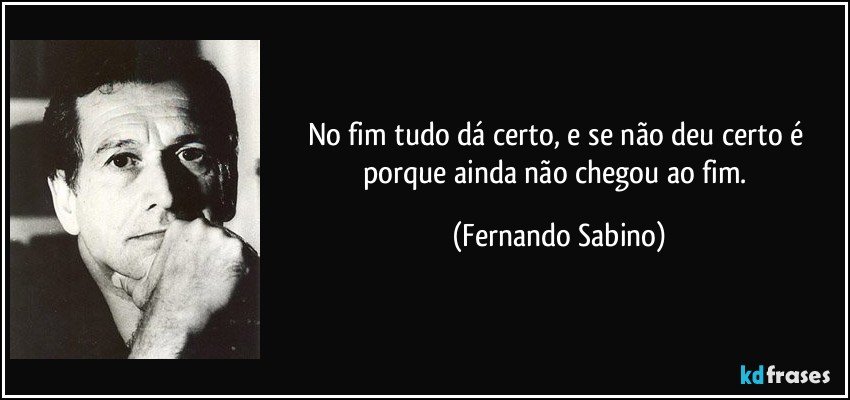 |
| Pseudo-John-Lennon-Zitat. |
Dieses vom Vater des brasilianischen Schriftstellers Fernando Sabino auf Portugiesisch geprägte Bonmot wird im 21. Jahrhundert sehr oft John Lennon oder Oscar Wilde unterschoben.
 |
| Pseudo-John-Lennon-Zitat. |
Auf Englisch und Deutsch taucht das Zitat erst im 21. Jahrhundert auf, entweder als anonymes Sprichwort, asiatische Weisheit oder es wird - immer ohne Angabe einer seriösen Quelle - Oscar Wilde (seit 2003), oder John Lennon (seit 2008) unterschoben.
Entwicklung des Zitats von 1988-2013:
Das Pseudo-John-Lennon-Zitat tauchte erstmals in dem 1988 erschienenen Buch "O tabuleiro de damas" ("Das Schachbrett") des brasilianischen Schriftstellers Fernando Sabino auf.
Sein Vater Domingo Sabino hatte ihn mit diesem inzwischen weltweit in vielen Sprachen beliebten Spruch einmal aufgemuntert.
- "O melhor, talvez, que me lembre, foi o que me disse um dia em que me encontrou entregue à aflição de espírito: “Meu filho, tudo no fim dá certo. Se não deu, é porque ainda não chegou ao fim."
Fernando Sabino: "O tabuleiro de damas" Editora Record, Rio de Janeiro: 1988, S. 79 (quoteinvestigator)
"Vielleicht das Beste, an das ich mich erinnere, ist, was er zu mir einmal sagte, als er mich niedergeschlagen sah: 'Mein Sohn, am Ende wird alles gut. Und wenn es nicht gut wird, ist es noch nicht das Ende.'"
- "Para lembrar uma frase do pai de Fernando Sabino, por quem tenho uma grande admiração: no fim tudo dá certo. Se não deu certo, é porque ainda não chegou ao fim." (Link)
- "Everything is OK in the end. If it's not OK, it's not the end." Anonym (Link)
(Erste Erwähnung auf Englisch im Usenet. Ohne Zuschreibung.)
- "So we know, as someone said, everything will be okay in the end. If it's not okay, it's not the end!" Anonym (Link)
-
"Am Ende wird alles GUT. Wenn es nicht gut wird ist es noch nicht das Ende. (Oskar Wilde)"
muenchnersingles.de
(Erste Zuschreibung an Oscar Wilde)
- "Everything will be okay in the end. If it's not okay, it's not the end. (John Lennon)" doktorandenforum.de
(Erste Zuschreibung an John Lennon)
- "am ende wird alles gut und wenn es nicht gut ist, ist es noch nicht das ende (oscar wilde)"
lehrerforen.de
- Sonny Kapoor: 'In India, we have a saying – everything will be all right in the end. So if it is not all right, it is not yet the end.'
"The Best Exotic Marigold Hotel", Film (Link)
2012
- "Bei Oscar Wilde las ich dazu den schönen Satz: »Am Ende wird alles gut. Und wenn es nicht gut ist, dann ist es nicht das Ende.« " (Link)
- "Am Ende wird alles gut. Und wenn es nicht gut ist, dann ist es noch nicht das Ende. (indisches Sprichwort)" (Link)
- "'... everything will be okay in the end and if it's not okay it's not the end' (attributed to John Lennon among others)" (Link)
Varianten
- "No fim, tudo dá certo. Se não deu, ainda não chegou ao fim." Fernando Sabino
- "No fim tudo dá certo, se não deu certo é porque ainda não chegou ao fim." Fernando Sabino
- "It will turn out fine in the end. If it's not fine, it's not the end."
- "Everything is going to be fine in the end. If it's not fine it's not the end."
- "In the end, everything will be ok. If it's not ok, it's not yet the end."
- "Everything is OK in the end. If it's not OK, it's not the end."
- "Everything will be okay in the end. If it's not okay, it's not the end."
- "Am Ende wird alles gut! Und wenn es nicht gut ist, ist es noch nicht das Ende."
- "Am Ende wird alles gut. Und wenn es nicht gut ist, dann ist es noch nicht das Ende."
- "Am Ende wird alles gut sein. Wenn es nicht gut ist, dann ist es nnicht das Ende."
Auf Deutsch oder Englisch ist das Zitat in keinem digitaliserten Text vor dem 21. Jahrhundert zu finden. Auch deswegen kann es nicht von Oscar Wilde oder John Lennon stammen.
Es ist äußerst
unwahrscheinlich, dass es noch jemand an versteckter Stelle in ihren
Schriften entdeckt, da schon Viele vergeblich gesucht haben.
Es ist auch sehr unwahrscheinlich, dass jemals eine
seriöse Quelle für die Behauptung gefunden wird, das Zitat sei eine
indische oder asiatische Weisheit, da diese Zuschreibungen alle erst ein
paar Jahre alt und aus philologisch nicht vertrauenswürdigen Quellen stammen.
________
Quellen:
Fernando Tavares Sabino: "Zélia, uma paixão - biografia", Record: 1991, S. 249 (Link)
Fernando Tavares Sabino: "No fim dá certo - crônicas", Record: 1998, S. 217 (Link)
Google
Wikiquote: "attributed to Lennon, but no verifiable source found."
Wikiquote portugiesisch
Quora
2003: Frühe Zuschreibung an Oscar Wilde: Anka 27.08.2003 14:00 Uhr muenchnersingles.de
2008: Früheste Zuschreibung an John Lennon: holladiewaldfee 04.11.2008, 17:11
doktorandenforum.de
2011: "The Best Exotic Marigold Hotel", Film, 2011, UK, Regie: John Madden (Link)
shepherdproject.com/the-best-exotic-marigold-hotel-review/
2015: Asiatische Weisheit: (Link)
Falsche Zuschreibungen findet man auch in vielen unseriösen Zitatsammlungen (Google).
----
----
Dank:
Ich danke den Autorinnen von Wikiquote, (Nachtrag:) und Garson O'Toole für seine zusätzlichen Funde.
Letzte Änderung:31/1 2023 (O'Toole, Vater)
1967?: (Link)

